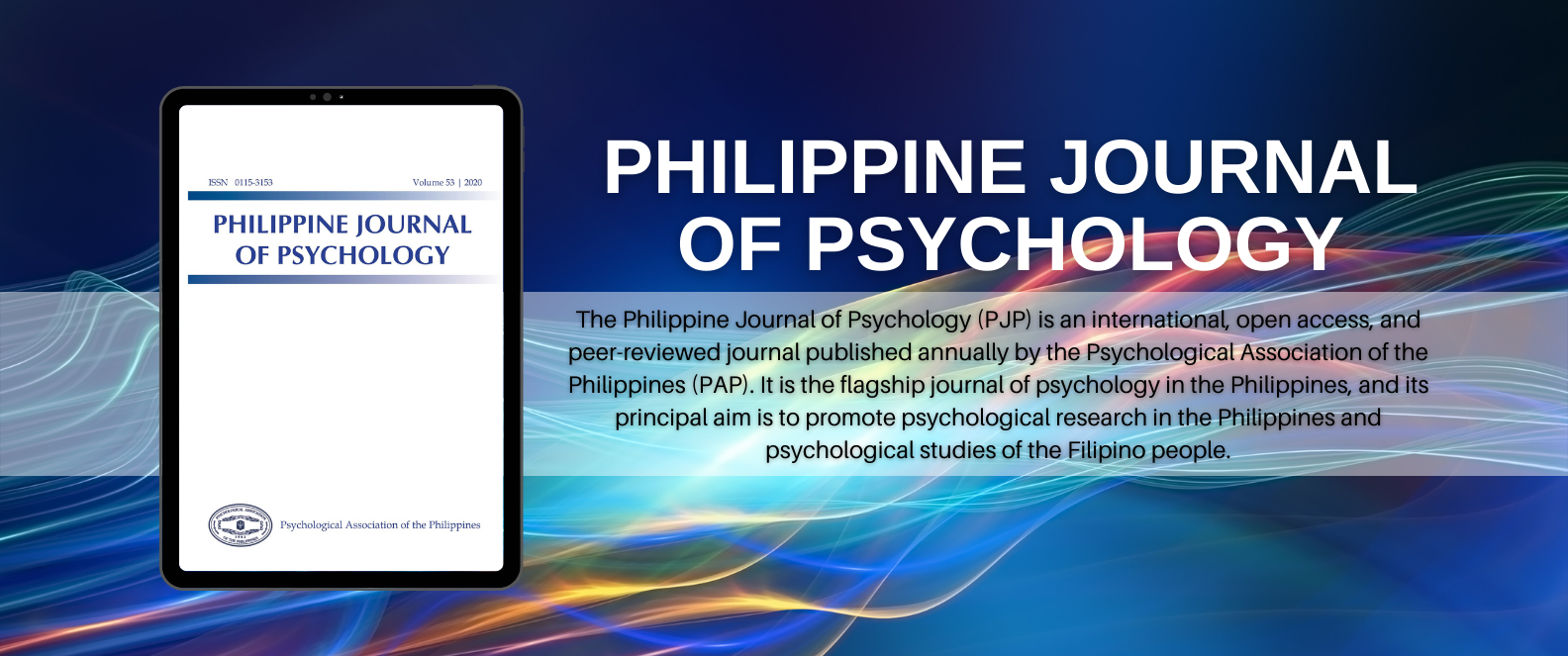


The Psychological Association of the Philippines (PAP) reiterates its stand against discrimination on the basis of sexual orientation and gender identity and expression (SOGIE) and rejects recent narratives that directly or indirectly use psychology in ways that misinform the public and stigmatize... Read more
Author: Psychological Association of the Philippines Inc.
Volume: 57 No. 2025 | Publication: 2025-11-24
| Download PDFThis study aims to elucidate how traditional notions of gender roles shape the lived experiences of tagasalo ‘tomboys’ (i.e., lesbian women) and bakla (i.e., gay men) in their families. Tagasalo has been conceptualized as a family member who takes care of others or comes to their rescue. A qualitati... Read more
Author: Junix Jerald I. Delos Santos
Volume: 57 No. 2025 | Publication: 2025-10-14
| Download PDFMore Tomboy, More Bakla Than We Admit: Insights Into Sexual and Gender Diversity in Philippine Culture, History, and Politics (2021), edited by Mark Blasius and Richard T. Chu, is a 480-page anthology that delves into indigenous perspectives of queer experiences in the Philippines, with the aim... Read more
Author: Ruod Ariete
Volume: 57 No. 2025 | Publication: 2025-09-12
| Download PDFThis study used positioning theory as a discursive approach to understand how hate speech targeting lesbian, gay, bisexual, and transgender (LGBT) people is called out and defended in public. Positioning theory argues that every utterance is a speech act that ascribes either a right or a duty to the... Read more
Author: Mira Alexis P. Ofreneo, Cassie Beatrice M. Camarao, Gideon P. Bendicion, and Lissa H. Custodio
Volume: 57 No. 2025 | Publication: 2025-09-12
| Download PDFThe Attitudes Toward Transgendered1 Individuals (ATTI) Scale aims to assess transgender-related stigma in the general population. Higher scores on this scale reflect more positive attitudes toward trans people. This study seeks to establish the validity of this scale in the Philippines through meas... Read more
Author: Raymond Aquino Macapagal
Volume: 57 No. 2025 | Publication: 2025-08-18
| Download PDFThis scoping review identifies how sexual orientation was operationalized and measured in five extant Philippine studies using large population-based samples: the 2003 National Demographic and Health Survey (NDHS); the Young Adult Fertility and Sexuality Study 3 (YAFS3); the Young Adult Fertility an... Read more
Author: Jan Gabriel M. Castañeda and Noriel P. Calaguas
Volume: 57 No. 2025 | Publication: 2025-08-13
| Download PDFQueer affirmative counseling practice (QACP) is the practice of counseling that is informed by, and affirming of, queer and trans perspectives, identities, and realities (Ranade et al., 2022). Opportunities for training mental health professionals (MHPs) in this are few and far between, especial... Read more
Author: Divine Love A. Salvador
Volume: 57 No. 2025 | Publication: 2025-08-06
| Download PDFThis study explored the social representations of COVID-19 vaccines. Specifically, it investigated the content and the structural configuration of the social representations of COVID-19 vaccines among working-age eligible recipients. Data were collected from 50 fully vaccinated and 50 unvaccinated w... Read more
Author: Jhio Jan A. Navarro and Khent V. Adenix
Volume: 56 No. 2024 | Publication: 2025-07-07
| Download PDFThis paper documents the development and initial evaluation of the Resilience-Focused Family Psychoeducation (RFFP), an intervention program for families in a post-disaster resettlement community facing multiple adversities. Implementing the RFFP program entailed three phases involving a needs asses... Read more
Author: Nephtaly Joel B. Botor, Marison Felicidad R. Dy, Jaclyn Marie L. Cauyan,Marie Grace A. Gomez, Abigail P. Del Puerto
Volume: 55 No. 2022 | Publication: 2024-04-06
| Download PDFThis study aimed to examine the positive and negative job characteristics that impact employees’ working experience in a country located in the Global South during the COVID-19 pandemic using the job demands and resources (JDR) theory as a framework. Data collection happened approximately one year a... Read more
Author: Emerald Jay Ilac, Jaimee Felice Caringal-Go, Ma. Tonirose Mactal, Mendiola Teng-Calleja
Volume: 55 No. 1 | Publication: 2022-03-08
| Download PDFThe purpose of this paper is to identify the work-life balance crafting strategies of workers in dual income relationships in the Philippines, and to explore their relationship with well-being. A sequential exploratory mixed-method approach was utilized. Interviews were first conducted among 12 work... Read more
Author: Jaimee Felice Caringal-Go, Ma. Regina M. Hechanova
Volume: 55 No. 1 | Publication: 2022-03-07
| Download PDF